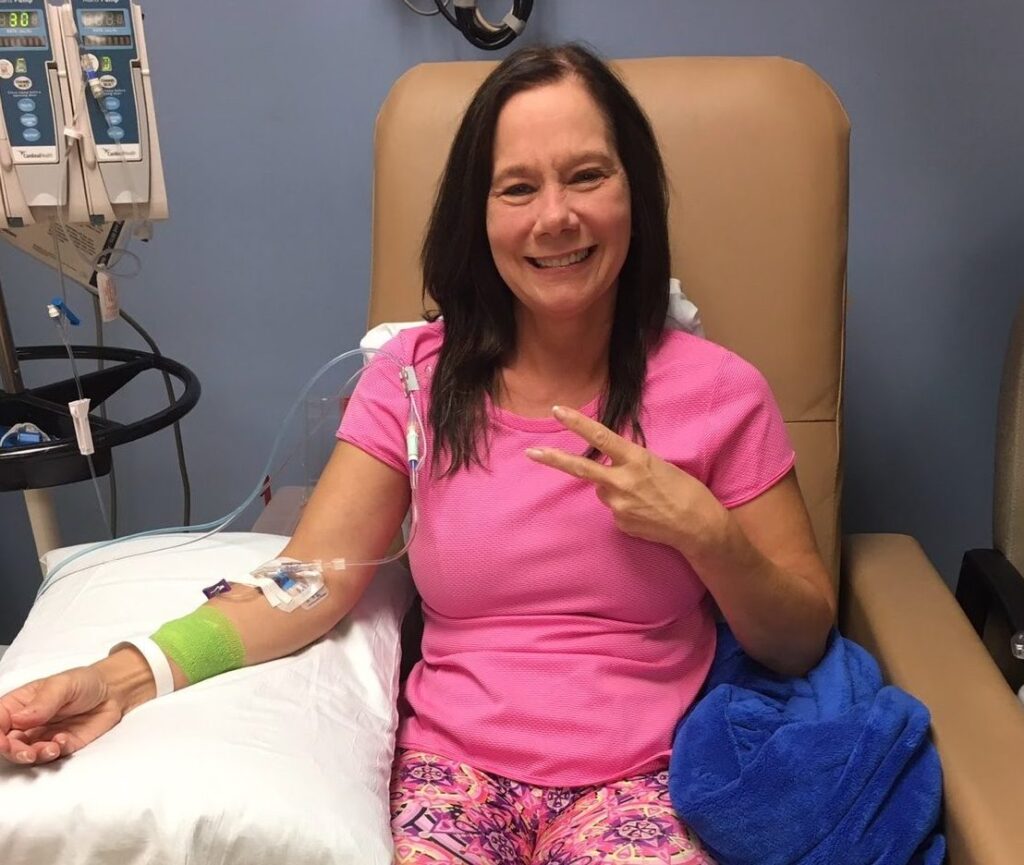Breast Cancer Survivors Strong Support System Helps on the Journey
Friends who have been there, family and, most of all God, help breast cancer survivors on their road to health.
Michelle Faught, a self-employed household manager, didn’t let breast cancer keep her down. Two weeks after having a single lumpectomy, with her surgeon’s approval, she kept her plans to hike 23 miles on the Appalachian Trail with a 25-pound backpack. “I really did it for myself and my children. I wanted them to know I’ve got this,” recalls Faught, now 53. “It seemed like it built me up.”
She’d discovered a lump after returning from a ziplining course in Melbourne, when she was bruised and aching from the class and obstacle course. “I just rubbed where it hurt,” says the Winter Haven resident.
Ironically, she’d just learned another woman she knew was requiring a repeat mammogram.
Tina Worth, a registered nurse at Winter Haven Women’s Hospital Mother and Baby Unit, found a lump the size of a golf ball after Renee Ratliff, a labor/delivery nurse at the hospital, had breast surgery. “I found out I had breast cancer right after her,” Worth says, who calls Ratliff her breast friend. “She was my buddy system.”
The 57-year-old Ratliff, who was being checked every six months after a suspicious area was found during annual checkups, says she “never felt a lump at all.”
The incidence of breast cancer in Florida is declining – from a rate of 134.5 per 100,000 in 1999 to 113.8 per 100,000 in 2015, according to the Centers for Disease Control and Prevention.
Still, there will be some 19,860 new cases of breast cancer in Florida during 2018, according to projections by the American Cancer Society. That’s more than any other type of cancer, including lung and bronchus cancer with 18,710 projected new cases.
A strong support system is a real help when cancer is diagnosed, as Faught learned when suffering from estrogen-fed breast cancer. She’d tried to stay strong and deal with it herself as much as possible to spare her family. But things didn’t go as planned.
The original treatment protocol made with her surgeon, Dr. Vincent Carifi was for minimal radiation. Then her oncologist, Dr. Hassan Ebrahim, advised four rounds of chemotherapy plus six weeks of radiation and hormone therapy for five years to aggressively fight the disease. The hormone therapy didn’t go well: it affected her personality, her memory, her sleep, and caused deep-body aches.
She learned it wasn’t a good idea to push others away like she did at first. “Your friends and family need you to want them,” she explains. “That hurts them too when you’re not telling them things.”
She was humbled and accepted help from her son Cody and daughter Briana as well as her friend Ellyn Brinsko and WHH medical staff. She calls Beth Burgess, an oncology navigator, and Deb Schulte, cancer program manager, her guardian angels.
“My faith in Jesus Christ has become stronger than it’s ever been,” Faught says. “When all else fails, and I feel I’m falling apart, I go to my Bible and go down on my knees and I always get back up.”
Time flew as she found joy in her interactions at WHH’s Cassidy Cancer Center. “I fell in love with the place. The patients were so friendly,” she adds. “I’m just like this is fun. I don’t mind being here.”
Because of a family history of breast cancer, 43-year-old Worth had been concerned about it even before she reached 40. On Feb. 22, 2016, five days after her 41st birthday, she was diagnosed.
She did chemotherapy, then a double mastectomy with breast reconstruction. “The chemo took the cancer away, but I was still warned not to think about it again, just do the surgery,” Worth says.
The experience gave her “new insight,” she says. “I could not have gotten through it without God,” she adds. “Just don’t feel like you’re alone. We’re all here to support each other.”
They’d been monitoring Ratliff, then on Nov. 17, 2015, she was diagnosed with breast cancer. It was an invasive, Stage 2 cancer in her left breast. There also was a suspicious spot on the right breast.
She opted for a mastectomy on both breasts, with reconstruction. “I didn’t want to go through it again,” explains the Frostproof resident. “I just wanted to live.”
It was very rare to have breast cancer in both breasts, but the after the surgery she learned that had indeed been the case. “The first thing the doctor said [after the operation] was you made the right decision,” she adds.
Dr. Robert Gabordi did the operation at St. Joseph’s Women’s Hospital in Tampa.
Winter Haven Hospital, Winter Haven Women’s Hospital and St. Joseph’s Women’s Hospital are all part of the non-profit BayCare Health System.
“The way I got through it was my family, my husband and my children. I’m a born-again believer. I rely 100 percent on the Lord for my healing,” she says, explaining she believes God directed her to each of her physicians.
Her and Worth, who lives in Davenport, were able to go through the journey together for support. She still remembers, though, the best friend she lost 28 years ago to breast cancer. Martha Faith Alexander died five months and seven days after she was diagnosed; she chose a lumpectomy.
“It terrified me,” Ratliff admits.
Now she and Worth, both lactation consultants, are big breastfeeding advocates. “It’s amazing how you can come from something that is so devastating,” she says, “and have a better love for [breastfeeding].”
by CHERYL ROGERS
